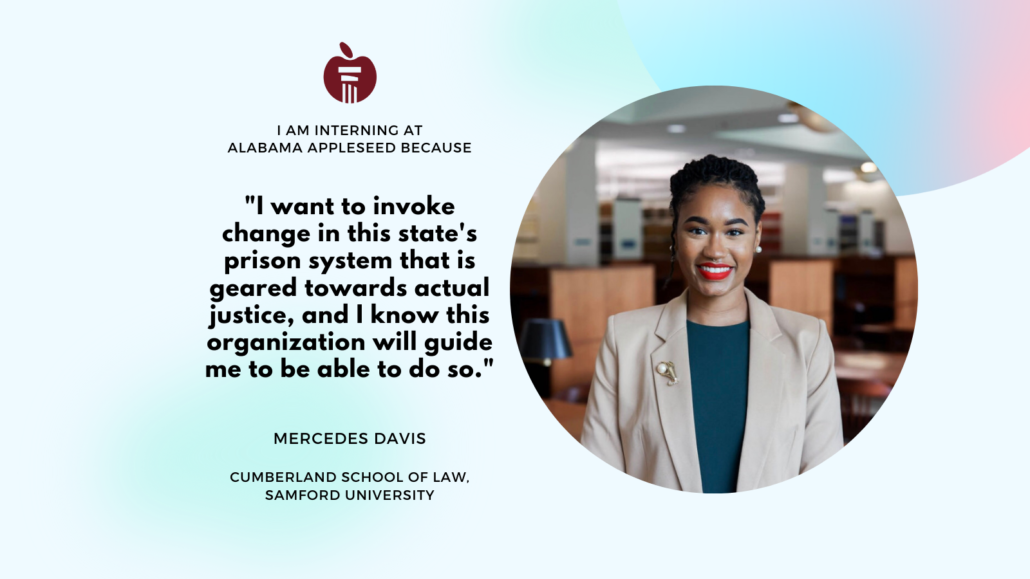
My name is Mercedes Davis, and it is with so much gratitude that I announce my internship with Alabama Appleseed this summer. I am a rising 2L at Cumberland School of Law and hold a bachelor’s degree in Criminal Justice from the University of Alabama at Birmingham.
My interest in criminal justice reform, specifically prison reform, began in the middle of my undergrad journey when I learned about Kalief Browder. In 2010, a 16-year-old Kalief was arrested for allegedly stealing a backpack containing certain valuables. At the time of his arrest, a judge set his bail to $3,000 and with his family not able to afford his $900 bond, Browder was sent off to Rikers Island. Two and a half months after entering Rikers, Browder appeared in front of a judge who consequently remanded him without bail because his arrest was a violation of his probation. Even if his family could have raised the money for his release, this judgment made bail no longer an option, and he was held at Rikers Island for three years without a trial. A backlog in the Bronx DA’s Office, combined with continuance upon continuance, amounted to Browder appearing before eight judges and nearly 1,000 days passing—more than 700 of those days in solitary confinement. Browder experienced violence at the hands of inmates and officers alike, and he attempted suicide numerous times while in prison.
On May 29, 2013, a judge freed Browder in anticipation of dismissal of the outstanding charges. Once released, he passed the GED exam and enrolled in Bronx Community College thereafter. Yet the horrors of solitary confinement and carceral violence Browder experienced at Rikers persisted, and he was admitted to a psychiatric ward three times after his release. On June 6, 2015, Browder died by suicide. Supreme Court Justice Anthony Kennedy cited Mr. Browder’s experience in the 2015 Supreme Court decision Davis v. Ayala as an indicator of a necessary “consideration of the many issues solitary confinement presents.”
Learning about Kalief Browder’s experience with the criminal justice system forever changed my view of the American justice system. The horrors he faced that ultimately led to his death, opened my eyes to the ugly truth about criminal justice—how the system perpetuates trauma for those intertwined in the legal system as well as the greater community rather than resolve and rehabilitate. For me, his story brought to light the deficiencies in mental health resources necessary for successful reintegration and the reality that many of our prisons operate as breeding grounds for ongoing, generational trauma.
As I began to delve into the world of prison reform, I couldn’t help but discover the horrific state of Alabama’s prison system. The issues that often make national headlines are in my own backyard. Learning about the DOJ’s ongoing investigation into Alabama’s prisons and mental health conditions litigation provided insight into the living conditions incarcerated individuals in Alabama are subjected to. The penal system that we have in place, in simple terms, is a big bully; and the bullied are the disenfranchised, the poor, and Black, Indigenous, and people of color (BIPOC). The more I learn, the greater my interest becomes in addressing criminal justice issues and human rights violations right here in Alabama.
Since becoming interested in criminal justice reform, I have volunteered with Aid to Inmate Mothers where I saw firsthand how maintaining and strengthening family connections can produce positive societal outcomes, such as reduced recidivism and healthy child development. I was also able to observe how the other side of the legal system worked during an internship with DA Lynneice Washington. I sat in on trials, learned about resources that help Jefferson County youth entering foster care, and researched programs with the potential to combat overcrowding in our jails and prisons for misdemeanors. Those experiences combined with my education in Criminal Justice and Sociology, have allowed me to better understand the intersectionality of the harmed and the harm inflicted by our criminal justice. I am eager for the opportunity I have at Appleseed to gain further understanding.
My goal for this summer is to learn as much as I can from Alabama Appleseed on how to fight for this state—working towards a better Alabama and protecting the Alabamians who need it most.





Leave a Reply
Want to join the discussion?Feel free to contribute!